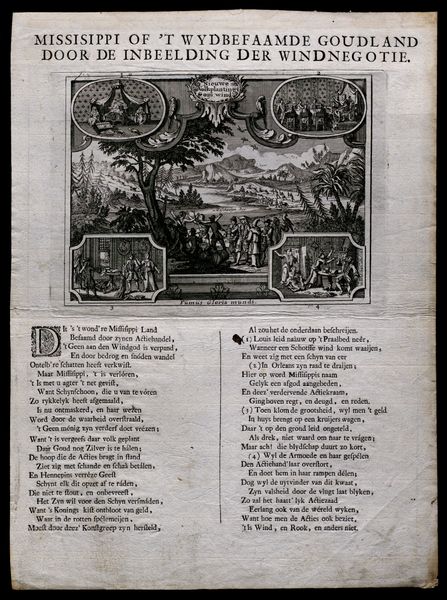Law, John (fl. ca. 1720) Missisippi of 'T Wydbefaamde goudland [Dutch] [Wonderful Land of Mississippi]
High-resolution images are available to schools and libraries via subscription to American History, 1493-1943. Check to see if your school or library already has a subscription. Or click here for more information. You may also order a pdf of the image from us here.
A high-resolution version of this object is available for registered users. LOG IN
Gilder Lehrman Collection #: GLC04946 Author/Creator: Law, John (fl. ca. 1720) Place Written: Amsterdam, Netherlands Type: Broadside Date: 1720 ca. Pagination: 1 sheet 27.5 x 24.5 cm Order a Copy
With engraved scene depicting Europeans trading gold with the Indians on the banks of the Mississippi. Publicizing settling in America. Written in Dutch. (The translation in the title here comes from the first line: "Dit 's 't wond're Missisippi Land / Besaamd door zynen Actiehandel, ....") The Mississippi "bubble" began in 1717 with the Company of the West, whose stock was driven up by speculators expecting gold and other wealth in Louisiana. The Company's collapse in 1720 involved French investors in difficulties similar to the British South Sea Bubble. From "Het Groot Verhaal".
Engraving extracted from "Het Groote Tafereel der Dwaasheild."
Citation Guidelines for Online Resources
The copyright law of the United States (title 17, United States Code) governs the making of photocopies or other reproductions of copyrighted material. Under certain conditions specified in the law, libraries and archives are authorized to furnish a photocopy or other reproduction. One of these specific conditions is that the photocopy or reproduction is not to be “used for any purpose other than private study, scholarship, or research.” If a user makes a request for, or later uses, a photocopy or reproduction for purposes in excess of “fair use,” that user may be liable for copyright infringement. This institution reserves the right to refuse to accept a copying order if, in its judgment, fulfillment of the order would involve violation of copyright law.
